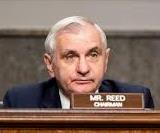 Following accusations by Senator Jack Reed (D-RI) that large egg producers were exploiting consumers following the emergence of highly pathogenic avian influenza (HPAI), Vital Farms commented on their pricing policy. Russell Diez-Canseco, CEO of the company confirmed that retail prices were raised from $5.99 to $6.99 for a dozen free-range specialty eggs. He claimed that the increase was as a result of higher prices paid to contractors together with escalation in ingredient, packaging and fuel costs.
Following accusations by Senator Jack Reed (D-RI) that large egg producers were exploiting consumers following the emergence of highly pathogenic avian influenza (HPAI), Vital Farms commented on their pricing policy. Russell Diez-Canseco, CEO of the company confirmed that retail prices were raised from $5.99 to $6.99 for a dozen free-range specialty eggs. He claimed that the increase was as a result of higher prices paid to contractors together with escalation in ingredient, packaging and fuel costs.
 Senator Reed has accused major egg producers and distributors of price gouging in a letter addressed to Federal Trade Commission. A major egg producer pointed to the depopulation of 44 million hens as a result of that has reduced the U.S. producing flock by approximately constant 20 million hens over a 12-month period, equivalent to a six percent reduction in supply.
Senator Reed has accused major egg producers and distributors of price gouging in a letter addressed to Federal Trade Commission. A major egg producer pointed to the depopulation of 44 million hens as a result of that has reduced the U.S. producing flock by approximately constant 20 million hens over a 12-month period, equivalent to a six percent reduction in supply.
Contributory factors to the rise in price for generic eggs include:-
- Reduced availability due to national flock six percent lower on an ongoing basis
- Strong demand based on perceived value against other protein foods.
- Disruption in supply chains,
- Distortion of prices by the prevailing benchmark price discovery system that amplifies swings in market price
- High retail margins imposed by chains in an inflationary environment
- Disinclination by chains to promote generic eggs other than as infrequent loss leaders.
At the end of the day, prices for eggs and other agricultural commodities are determined by supply and demand. The cost of production is irrelevant to wholesale prices and should be discounted as a contributory factor in determining shelf prices to consumers.